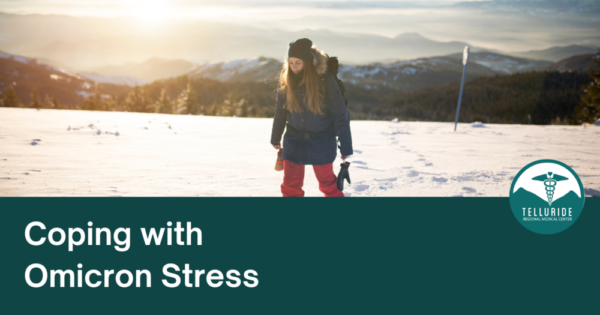
16 Jan Telluride Med Center, Mental Health Moment: Coping with Omicron Stress
Support the Telluride Medical Center’s COVID Fund here.
Register for vaccine here.
For more information surrounding the state’s COVID-19 dial, visit here.
For additional Telluride Medical Center (TMC) information on COVID, go here
The following is a note from the Telluride Med Center’s Licensed Behavioral Health Counselor, Lindsay Wright, about how to cope with Omicron stress.

We’ve been pretty busy around here responding to the current Omicron surge. I’m sure you have also been adjusting to how this new Covid variant is impacting your own lives, while dealing with the ongoing effects of being in this pandemic for nearly two years now.
As case numbers soar, many of the people I talk to report feelings of disappointment, fear, frustration, isolation, anxiety, confusion and exhaustion. Many have experienced cancelled holiday plans, concerns about the upcoming school semester for their children, or are coping with being ill themselves. The CDC predicts cases will continue to rise throughout the next few weeks, so how can we take care of our mental well-being during this stressful time?
First, we can keep ourselves physically safe. Taking practical steps to manage a stressful situation can help us to feel more empowered and confident during a stressful time, as problem-solving is itself a coping skill. The use of vaccinations and masks and making decisions that limit our risk of exposure are all tangible tools that can help us manage our risk and our anxiety as well. Everyone’s individual risk tolerance will look different, so make sure that you are making the best choices for yourself. If you need additional information to do so, please consult your primary care physician. It is important to make sure that your basic needs are met. Are you eating and sleeping well? Are you drinking enough water, limiting time spent on screens, taking time to be outside and moving your body? As basic as these things may seem, they can all greatly impact our daily ability to function.
Next, take time to examine your thoughts. As an evolutionary adaptation, our brains are wired to have what is known as a negativity bias – that is, our brains automatically gravitate towards identifying things that may be more negative or dangerous. As you might imagine, this served our unsheltered early ancestors well and helped them to stay safe. In 2022, we encounter far fewer daily threats, and this trait can often lead to more negative thought patterns, such as catastrophizing or dwelling on dark thoughts.
The first step to changing negative thought patterns is to identify them. Really pay attention to your thoughts and assess them. Hint: if your thoughts contain words like “never,” “the worst,” “should,” or “always,” they may not be serving you well. When you identify a negative thought, I invite you to approach it with curiosity. Ask yourself “what is contributing to this thought? Is it objectively true? Is there a different way that I could be thinking about the situation?” Identify new ways of looking at the situation, and try out these thoughts that feel a bit more helpful and balanced. By challenging your negative thoughts with more helpful ones as a practice, you are helping your brain to develop a more balanced view of the world, which can lead to improved mood.
If you need additional support in managing your physical or mental well-being, please reach out to myself or your primary care provider. I can be reached by calling the Telluride Medical Center at 970-728-3848. Or, if you are patient of Telluride Medical Center, message me through the center’s portal. If you are experiencing a mental health crisis, please reach out to the San Miguel County Mental Health Co-Responder by calling the Sheriff’s Office Dispatch at 970-728-1911 and requesting support.


Sorry, the comment form is closed at this time.